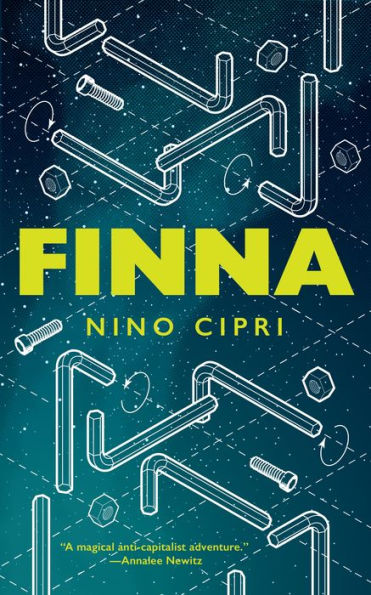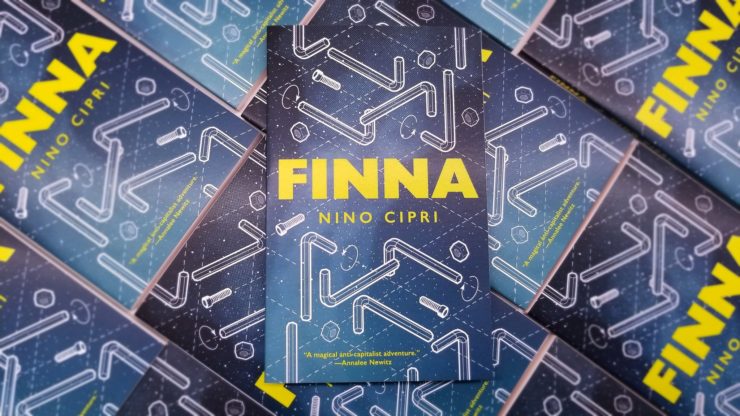Dating a coworker then breaking up with a coworker presents one very specific, very unfortunate hitch: being forced to see each other too soon after the dissolution of your relationship, at the low-wage exhausting job both of you can’t stand but can’t survive without… and that’s how Nino Cipri’s sf novella Finna opens. Ava and Jules are both employees at the (Ikea-clone) LitenVärld store and have only been separated for three days, so the wounds are still fresh.
However, on their first shared post-breakup shift, an older woman goes missing in their store—because she stumbled through a wormhole. Which, as it turns out, happens not infrequently.
While technically there used to be trained teams who used the LitenVärld-branded FINNA locator to rescue people who wandered off into alternate universes… that’s no longer the case. All the actual FINNA teams were disbanded due to budget cuts and corporate maneuvering, so it officially falls to the employees with the least seniority to risk dismemberment and death—and those two employees happen to be Jules and Ava. The pair of them have to work through their personal situation while falling through the multiverse, looking for the lost grandmother and trying to locate their own futures in the process.
Buy the Book


Finna
The most common relationship arc that one finds in fiction tends to be a fresh meeting that grows toward a romantic or, less often, platonic pairing-up. It’s exceedingly rare to read about the other kind of process, where a romantic relationship has already dissolved and the involved parties are trying to hash their way into a friendship—but that’s the thoroughly satisfying path Cipri has taken with Ava and Jules in Finna. The two lead characters aren’t in a post-breakup stage that the narrative intends to move toward “getting back together,” as we often also see; instead, Ava and Jules are working through the hurt of heartbreak that, at its core, still contains care and affection for each other.
While I’m not going to argue that this process of romantic-partner-to-intimate-friend is a uniquely queer phenomenon, it is a phenomenon that cannot be escaped in queer life. After all, when your dating pool and your friend pool and your friend-dating pool (and whatever else your relationships look like on that spectrum) are all the same pool, there’s a higher chance of needing to negotiate that space between relationships as they evolve over time. So, as a queer reader, I’m soothed and delighted simultaneously to see this fraught and feeling-full experience reflected as the significant emotional arc of such a rambunctious, socially critical romp of a novella. It’s part of our lived experience that I’d appreciate seeing more often, certainly.
As I noted in the review of Cipri’s recent collection of short fiction, Homesick, they have a real gift for imbuing characters with messy, silly, serious humanity while maintaining a critical lens on the world surrounding those characters. On the one hand, this is an interdimensional adventure quest; on the other, it’s a story about shifting relationship dynamics; on a third (alternate realities, why not), it’s about late capital, low-wage work, and the coercive systems we are imbricated within. Cipri’s closing author’s note references Ursula K. Le Guin, and I was unsurprised, because I was also thinking throughout the novella about that famous quote: “We live in capitalism, its power seems inescapable. So did the divine right of kings.” The energy of that argument hovers around the whole text.
Part of the shift in Ava and Jules’s relationship is, after all, about a shift in their opportunities to relate to the world(s). The Ikea-clone big box store both work in is, frankly, more harrowing than the people-eating living chairs that populate the world they tumble into through the wormhole. The manager, Tricia, filled me up to the brim with the helpless incandescent rage that lives in my bones after enough years in retail and loving people in retail, watching the system grind them to pieces. When offered the chance to escape, even the anxiety-driven Ava is ready to do so; Jules, the adventurer, was ready from the start. While the pair of them don’t fit together in romantic love, at the close of the novella, they do seem to fit together as companions on a grand adventure.
The deeply queer content and context of Finna isn’t just about Ava and Jules, either. Instead, the queerness of the novella is reflected in its way of thinking, of approaching life, of being friends and being critical. It’s not window-dressing but life-blood. Cipri’s approach to labor, love, politics, and potentiality are all imbued with a wondrous sense of complexity and questioning. This sense of possibility also drives the fast pace of the plot without losing any of the illustrative, rich political background; the novella is a multiverse adventure, complete with a monstrous clone hive and a submarine battle, but it’s also a reflection on our present moment in capitalism and survival-wage culture. Issues of race, gender, and debility are thoroughly interwoven as natural parts of life and experience, never ignored or pushed aside, simply present.
I agree with the flap copy, which calls Finna “rambunctious” but also “touching.” Ava and Jules have one type of relationship; Ursula and Farah have another while Uzmala and Farah will make one more, familial and intergenerational and tender across the board. Cipri writes a wild chase through universes that are at turns spooky and fascinating, just a little off, while giving us a substantially realized emotional arc that crosses several characters as well as critiquing the crushing state of labor and neoliberalism in the background. Finna is doing a lot, and it’s doing that ‘a lot’ very well—tightly written, elegantly described, and comedic without ever losing its serious attention on the all-too-human experience of heartbreak and the changeable self.
Finna is available from Tor.com Publishing.
Read an excerpt here.
Lee Mandelo is a writer, critic, and editor whose primary fields of interest are speculative fiction and queer literature, especially when the two coincide. They have two books out, Beyond Binary: Genderqueer and Sexually Fluid Speculative Fiction and We Wuz Pushed: On Joanna Russ and Radical Truth-telling, and in the past have edited for publications like Strange Horizons Magazine. Other work has been featured in magazines such as Stone Telling, Clarkesworld, Apex, and Ideomancer.










